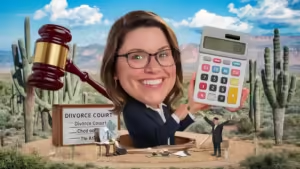Ever tried online filing and felt like you were attempting brain surgery blindfolded? That’s what Arizona divorce feels like. As we edge towards 2025, the Arizona divorce process remains a riddle wrapped in legal jargon. But don’t worry—I’ve got your back. Here are your Arizona divorce FAQs to help you navigate the system.
What makes the Arizona divorce process complicated?

Arizona divorce isn’t just about signing a couple of forms and calling it a day. The complexity lies in Arizona’s unique community property laws, residency requirements, and mandatory waiting periods. Unlike some states, Arizona requires both parties to equally split all assets and debts acquired during the marriage, regardless of whose name is on them. Plus, the state mandates a 60-day cooling-off period after filing, which means you can’t rush the process even if you want to.
How does Arizona treat assets and debts in a divorce?
Arizona is a community property state, which means all assets and debts acquired during the marriage are split 50/50. This includes everything from your house and car to your credit card debt and student loans. Exceptions include gifts and inheritances received by one spouse and kept separate from marital property.
What are the residency requirements for filing for divorce in Arizona?
To file for divorce in Arizona, at least one spouse must have lived in the state for a minimum of 90 days. If you’ve just moved to Arizona, you’ll need to wait it out for three months before you can file for divorce.
What steps are involved in filing for divorce in Arizona?

Meet Residency Requirements: At least 90 days living in Arizona.
File a Petition for Dissolution of Marriage: Submit this to your county’s Superior Court.
Serve Your Spouse: Legally deliver the divorce papers.
Wait for Response: Your spouse has 20 days to respond if they live in-state, 30 days if out-of-state.
Attend Hearings: If contested, you might need to attend mediation or a court hearing.
Finalize the Divorce: If uncontested, you can finalize after the 60-day cooling-off period.
Can I file for divorce online in Arizona?
Yes, you can file for divorce online in Arizona, which is like ordering your freedom from Amazon. The Arizona Judicial Branch’s eFile system allows you to submit your documents electronically. However, the rest of the process, like serving papers and attending hearings, still follows the traditional route.
What is digital divorce in Arizona?
Digital divorce in Arizona allows you to handle the entire process online, from filing the petition to finalizing the divorce. It’s convenient but requires thorough understanding and accurate completion of all forms to avoid delays.
What is a quick divorce in Arizona?
A quick divorce in Arizona is possible if both parties agree on all issues, including asset division, debt allocation, child custody, and support. This uncontested divorce can be finalized just after the mandatory 60-day cooling-off period.
Do I need a lawyer for an Arizona divorce?

You don’t need a lawyer, but having one can simplify the process and ensure you don’t miss any legal steps. It’s like having a GPS on a road trip—you can manage without it, but it makes the journey smoother and less stressful.
What’s the deal with digital divorce in Arizona?
Digital divorce in Arizona streamlines the process by allowing you to handle most of the paperwork online. It’s convenient, especially if you and your spouse are in agreement on the terms. You still need to meet the residency requirements and follow legal procedures, but the hassle of endless courthouse visits is minimized.
What if I cannot afford a lawyer for my Arizona divorce?

Legal Aid Services: Arizona offers a wealth of legal aid services for those in need. Organizations like Community Legal Services and the Arizona Legal Center provide free or low-cost legal assistance. They can help with everything from understanding the forms to representing you in court if necessary.
Pro Bono Attorneys: Some lawyers in Arizona offer their services pro bono, which means they work for free. These attorneys typically take on a certain number of pro bono cases each year to help those who cannot afford legal fees. You can find pro bono attorneys through the Arizona Bar Association or local legal aid organizations.
Self-Help Resources: Arizona courts provide extensive self-help resources, including forms and instructions for those who choose to represent themselves. The Maricopa County Law Library Resource Center is a valuable resource, offering guides and legal forms that you can use to file for divorce on your own.
DIY Divorce Kits: For those who prefer a more hands-on approach, DIY divorce kits are available. These kits provide all the necessary forms and instructions to file for divorce without a lawyer. They are designed to be user-friendly and can save you a significant amount of money on legal fees.
Mediation Services: Mediation is another cost-effective alternative to hiring a lawyer. A mediator is a neutral third party who can help you and your spouse reach an agreement on the terms of your divorce. Mediation can be much cheaper than going to court and can help you avoid a lengthy and costly legal battle.
Court Fees Waivers: If you are truly unable to pay the court filing fees, you can apply for a fee waiver. The court will review your financial situation and may grant a waiver, allowing you to proceed without paying the standard filing fees.
What forms do I need for an Arizona divorce?

Petition for Dissolution of Marriage: The primary form to start the process.
Summons: Notifies your spouse of the divorce.
Preliminary Injunction: Prevents both parties from certain actions during the divorce.
Notice of Right to Convert Health Insurance: If applicable.
How do I serve divorce papers in Arizona?
Serving divorce papers in Arizona might feel like you’re trying to deliver a flaming bag of dog poop to your ex’s front door. But fear not—there are straightforward methods to get this done:
Hire a Professional Process Server: This is often the easiest and most reliable way. A process server knows all the ins and outs of the legal requirements.
Use the Sheriff’s Department: The sheriff can serve the papers for a fee. It’s official and ensures the papers are delivered correctly.
Ask a Friend: You can have a friend or relative over 18 serve the papers. Just make sure they follow the legal guidelines and aren’t emotionally involved.
Certified Mail: If your ex is cooperative, you can send the papers via certified mail with a return receipt requested. Keep that receipt as proof of service.
What if my spouse doesn’t want to be served?
Court Approval for Alternative Methods: With the court’s permission, you can serve them via publication. This involves placing a notice in a local newspaper where your spouse is likely to see it.
Posting in Public Places: In some cases, posting the notice in a public place might be acceptable. Again, this requires court approval.
What about child custody and support in Arizona?
Arizona courts prioritize the best interests of the child when determining custody and support. They consider factors like the child’s relationship with each parent, the parents’ living situations, and the child’s needs. Both parents are generally encouraged to maintain an active role in the child’s life.
How is community property divided in Arizona?
In Arizona, community property is split 50/50. This includes all assets and debts acquired during the marriage. Imagine cutting your favorite pizza right down the middle—each of you gets an equal slice. This applies to houses, cars, bank accounts, and even debts like credit cards and mortgages.
Can separate property become community property?
Yes, separate property can morph into community property if it’s commingled. For example, if you use your inheritance to buy a house with your spouse and put both names on the deed, it’s now community property. Keep things separate if you want them to stay that way.
How long does an Arizona divorce take?
It depends on whether the divorce is contested or uncontested. An uncontested divorce can be finalized after the 60-day cooling-off period. If contested, it can take several months to over a year, depending on the complexity of the case and court schedules.
What’s the difference between separation and divorce?
Separation: Think of it as a trial run for being single. You’re still legally married, but you live apart and handle finances separately. It’s less final than divorce and doesn’t dissolve the marriage.
Divorce: This is the legal end of the marriage. Assets and debts are divided, custody is arranged, and both parties move on. In Arizona, both processes require filing similar forms, but divorce is the final cut.
Can we mediate our divorce in Arizona?

Yes, mediation is encouraged to resolve disputes without going to court. It’s a less adversarial process where a neutral third party helps both spouses reach an agreement on various issues, such as property division and child custody.
Can I modify my divorce decree in Arizona?
Yes, you can request a modification if there’s a significant change in circumstances, such as a job loss, relocation, or change in the needs of a child. You’ll need to file a petition to modify with the court and demonstrate why the change is necessary.
